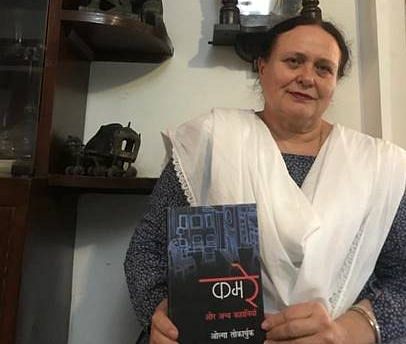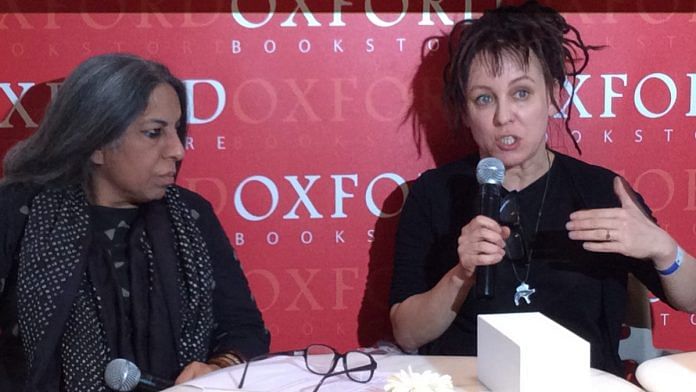New Delhi: When Polish author Olga Tokarczuk won the 2018 Nobel prize for literature on 10 October this year, she had plans to celebrate with a dinner. “I am going to drink wine and eat good Indian food,” she told Michał Gostkiewicz of Wirtualna Polska (WP) magazine in one of her first press interactions that day.
“Vegetarian?” Gostkiewicz asked, to which the dread-locked feminist Nobel winner replied, “Of course!”
Tokarczuk, whom the Academy awarded for her “narrative imagination, that with encyclopedic passion, represents the crossing of boundaries as a form of life,” has more cultural ties with India than one might first assume.
Even before the critically acclaimed Polish author was propelled into the international spotlight by virtue of her 2007 novel Flights being published in English in 2018, three of her short stories were already available in Hindi as far back as 2014.
Maria Puri, now 64 and a nearly lifelong resident of Delhi, had been diligently translating Tokarczuk’s works since 2013, “having followed her career and garnered a deep appreciation for her writing despite moving to India 40 years ago”, the native Pole tells ThePrint.
In case you needed to know: yes, you can read some of the works of Olga Tokarczuk, the Polish author who has just won the Nobel Prize for Literature, in Hindi. 'Kamre aur anya Kahaniyan' ('Rooms and other Stories') were translated into Hindi by Maria Puri. pic.twitter.com/YAjQuGpbAs
— Krzysztof Iwanek (@Chris_Iwanek) October 10, 2019
“Her writing is very universal, and she speaks from a woman’s point of view, which is why I wanted young readers and students to be acquainted with what she had to say,” says Puri, a freelance translator and academic.
With the support and literary adventurism of publisher Rajkamal Prakashan, Kamre Aur Anya Kahaniyan (Rooms And Other Stories) by Olga Tokarczuk was released for the benefit of Indian readers in 2014, and Tokarczuk, along with 14 other writers and representatives of culture, was invited as a guest of honour to the New Delhi World Book Fair.
“I have pictures,” Puri laughs. “Although I’m incredibly camera-shy, I remember feeling like this was an important moment for Polish literature in India,” she says. That was the first, and so far only, time that Tokarczuk has made a trip to India, with one slotted for late last year getting cancelled due to her mother’s ill health.

Also read: The Polish ambassador to India is fluent in Hindi & Urdu, loves biryani and Bollywood
Olga Tokarczuk and the India connection
During her time in Delhi, Puri recalls,Tokarczuk “loved the vibrancy and diversity that the city had to offer, even though she was a bit overwhelmed by the crowds.”
Puri introduced Tokarczuk to the simple pleasure of drinking tea in Delhi’s wintry February air, and together, they moved between monuments and collecting mementos. “The one thing that really touched her was to witness the seeming harmony with which animals and human beings co-habitate within a city,” Puri tells ThePrint. “The fact that people would often take the time to feed these stray dogs and leave bird-feed for the pigeons.”
At the time, evidently overcome by the cultural complexities of an Indian city, Tokarczuk felt “I cannot write about India as yet”, but “one of her newer novels, published in Polish last year,” Puri says, “features an Indian character named Saraswati very briefly”.
“I think she’s still grappling with the idea of India,” Puri laughs.

During her trip five years ago, Tokarczuk visited Rajasthan and Amritsar, and was particularly “astounded that so many people would make the journey to visit the Golden Temple early as 6am or past nightfall,” Puri recalls.
But it isn’t just Tokarczuk that carries little known anecdotes from India. Poland, it turns out, has a long standing socio-cultural kinship with this subcontinent. “We just opened a new connection, a direct flight from Delhi to Warsaw last month,” Polish Ambassador to India, Adam Burakowski, tells ThePrint. “The number of Indians in Poland is also growing… And Indian culture has been able to have a very distinct impact on Polish culture.”
Burakowski points out that the Jagiellonian University in Krakow was one of the first to house Sanskrit faculty in the 19th century, and that thousands of Polish refugees from World War II found a home in Kolhapur in Maharashtra and Jamnagar in Gujarat.
The ambassador himself, who has witnessed three Polish authors winning the Nobel prize in literature during his term, has mastered not just Hindi, but Urdu as well — having translated the works of Pakistani writer Saadat Hasan Manto into Polish. “And I’ve seen more than 400 Bollywood films; I watch a Hindi film nearly every day,” he told ThePrint just last year.
Also read: For these Poland nationals with ties to World War II, ‘home’ is a tiny village in Maharashtra
The English stronghold
Tokarczuk might have been ‘discovered’ in India in 2014, but it took the mainstream legitimacy granted by the English canon to really make her accessible in a global market. Flights, her ambitious 416-page literary kaleidoscope of multiple narratives, which the author clubs under her “constellation novels”, was first published in Poland in 2007, and only translated into English over a decade later. In 2018, it won the Man Booker International Prize, making Tokarczuk the breakthrough Polish author to be bestowed that honour.
Tokarczuk was already a literary heavyweight in her native country, revered as “a vegetarian feminist in an increasingly reactionary, patriarchal country”, as well as “a public intellectual whose every utterance can make news headlines”, Claire Armitstead, associate editor of culture for The Guardian, writes.
But even the author wonders “how my life would have worked out if my books had been translated into English sooner, because English is the language that’s spoken worldwide”, Tokarczuk said earlier this year, “and when a book appears in English it is made universal, it becomes a global publication”.
The first chapter from Tokarczuk’s 2009 novel Drive Your Plow Over the Bones of the Dead (the English version of which came out only this year), was already published in the monthly Hindi literary magazine Hans in August 2018, courtesy an editorial call made by Dr Balwant Kaur. It was accompanied by an interview with Puri’s fellow translator Dr Monika Browarczyk, both of whom are currently translating Flights and Drive Your Plow into Hindi for publishing next year.

“I saw Ms Olga’s books in acclaimed book stores in Delhi even before she got the Man Booker Prize,” ambassador Burakowski says. “While translation to English is very important, I think the translation to Hindi is perhaps better for Indian readers, because it’s a language that is able to better, or more accurately, capture some of the nuances in the implied feelings of Polish words.”



